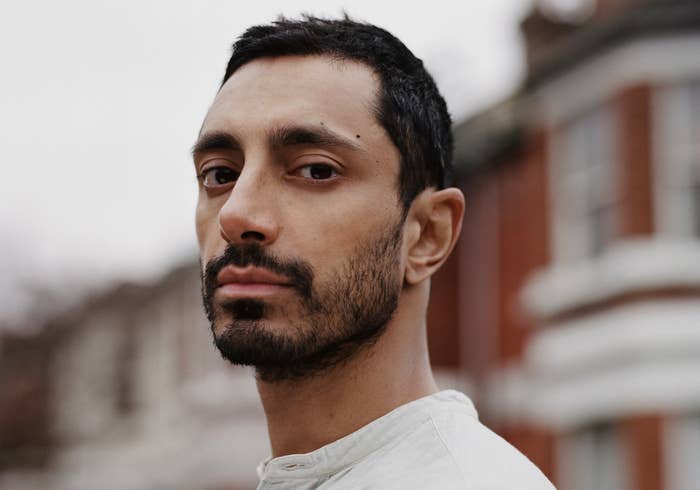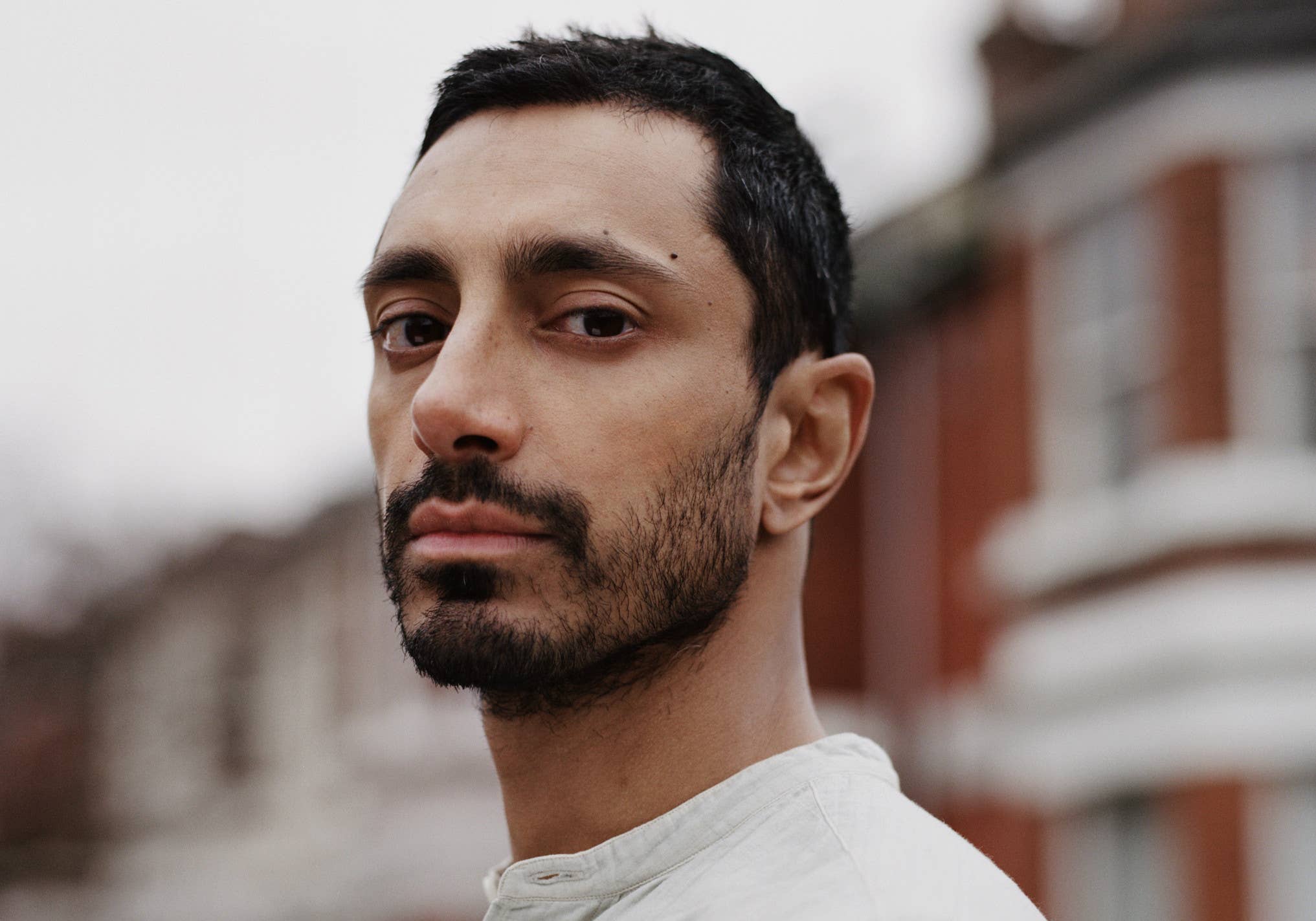
We all know Riz Ahmed for being our friend, hero and rubber-dingy enthusiast on the big screen in a number of culture-shifting and critically-acclaimed films, such as Four Lions, Ill Manors and Jason Bourne. But while showcasing his acting chops in movies, the London native has also used his voice as a lyricist to stand up against issues that crop up for millions in today’s society.
Formerly known as Riz MC, Ahmed has expressed himself musically both as a rapper and spoken word artist, working closely with Heems as the Swet Shop Boys, and merging that with a mixing pot of cultures to create a sound that has stretched to all corners of the world. Following his 2012 Riz MC debut Microscope, Ahmed makes his return with new album The Long Goodbye—which has been dubbed a “break-up” album. Accompanied by a short film, directed by Aneil Karia, The Long Goodbye sees Riz tap into emotions of despair, sadness and desperation, as Great Britain—better known as “Britney”—attempts to kick him out of his very own home and strip him of his freedom.
We caught up with Riz Ahmed to discuss the new album and short film, his musical influences, and why music is such an important outlet for him.
COMPLEX: Since starting out in the late 2000s, you’ve made music under the Riz MC moniker, but now you’re releasing The Long Goodbye under your real name. Why is that, and why now?
Riz Ahmed: I think it’s significant because of the part of my life that I’m in right now. And in terms of the album and the stories it’s telling you, it’s important to not hide who you are and not put on any personas, to be kind of mask-off in a way... And also just to be my full, unapologetic self—and in a way, that’s what this album does. I bring storytelling to the table, spoken word, grime, rap, Bollywood influences, American music influences, so in a way it’s a real reflection of my full self.
“If you look at the comments that even our Prime Minister has made, it kind of makes you feel that you’re getting dashed out of your own house!”
You call this album a break-up album, but instead of a love interest, it’s with your own country. What was the inspiration for making this the theme of the project?
Around the time we made the last Swet Shop Boys project, Donald Trump and Brexit was happening and it felt like, “Rah, we’re in the middle of a break-up.” I was playing with this idea for a while, because people talk and think about this idea a lot. I wanted people to know how it feels; I wanted to be able to find an emotional way in to this, instead of another chin-stroking kind of debate. The fact is, you can’t relate to people just on their thoughts—you have to feel it. So I wanted to open up these heartbreak feels of thinking, “OK! Wow. My country is breaking up with me after we’ve built this home together.” And to think of Windrush cases and trying to deport people, and the way that hate crimes have been spiking, if you look at the comments that even our Prime Minister has made, it kind of makes you feel that you’re getting dashed out of your own house! They’re trying it, or at least making us feel unwelcome in our homes. So there wasn’t one particular moment that made me think that I want to make this album, or that album.
How much would you say politics influences your music?
I’m not rapping about politics from my point of view. As much as people might see it as a political record, it’s a very personal record. For the issues that I take up in this project, people may see it as political, and some people see it as day-to-day life. What’s going on in the world changes the way I can interact with people and how people interact with me—it changes the hopes I have for my life and my hopes and my dreams, it changes the way I see myself in the world, it changes the way I have dreams or nightmares. So for me, I’ve never made political music. People might put that label on it, but to me, it’s coming from a very personal experience.
There are so many different sounds on The Long Goodbye, but is there a main musical influence that you put into the record?
I would say I’ve taken the influences into my music that have always been there for me. You hear influences in there that are Bollywood, or even Qawwali music, you’ll hear stuff on there that draws from grime, and there’s tracks on there where I’m MCing double time—which is kind of what my background is. So I think it’s a whole mixture of Eastern and Western influences kind of thrown together. And not in a way where I’m thinking, “Oh, I’ll mix this with that.” But Redinho, the producer, is just incredible: we made the Swet Shop Boys records together and he just gets what I’m trying to do.
So when you come to creating with Redinho, what’s the creative process like between the both of you? Do you write to the music, or does he write to you?
Bit of back and forth, really. But this time, Redinho wrote the beats and sent it to me, but because we’ve worked together on the Swet Shop Boys, he understood what I was trying to put out. I wanted to put out something that’s distinctive, my own sound, and use all the mixtures of influences that I have.
I see you have some dates in NYC on your upcoming tour. How much are you looking forward to performing the album live, and how is your relationship with the States?
I’m always really enjoying going out playing in the States. When I look at my audience, it’s kinda spread out across the world a little bit. I’m not trying to make chart-topping music, but I know I’ve got this dedicated fanbase in the States and overseas. But I always love going to America. I feel that, over there, you can speak more about your identity, whereas in the UK, I think people can get a bit more nervous about that.
So going into the film that comes with The Long Goodbye, it’s like you’ve merged your two creative passions together. Was important for you to do this?
To be honest, we’re building a world with this album. If you think about it, we’ve got this story of this break-up, and the whole album tells the story of that breakup. So as a part of making that film, we felt like it would be a good way of creating that world. I wouldn’t say that I felt like I had to do it, but I felt like I wanted to talk about some of the themes and thinking behind the album.
“As much as people might see it as a political record, it’s a very personal record.”
Aneil Karia directed the short film—how would you describe your creative relationship with him?
Yeah, we have a really natural process. It’s just about talking and finding our way, not pulling any punches, and being unapologetic and real. So yeah, it’s a very organic process. We’re from the same area as well.
Would you say that music, your earlier works especially, has contributed to your come-up and success on the big screen?
I mean, music is my space where I can be fully myself. I’m not saying lines from somebody else’s script—I’m speaking about what’s on my mind and what’s in my heart. So I don’t think of music as something that helps me in my acting. I see it as being a pure thing for me. I don’t need to be making music; I can earn money being an actor. I only make music because I’ve got something that I have to get off my chest, and I feel like there’s something that has to be said out there in the world—that hasn’t been said. I make music because when I see the crowds that come to my shows, like I said before, they don’t look like the crowds that you see anywhere else. And I know that there are people that connect to what I’m saying, and the way I’m saying it, and my experience. It doesn’t feel like something I do to build any kind of career strategically—it all feels very raw to me.
Do you believe that music, acting and other creative outlets are helping prevent younger people from going down the wrong paths?
I think it’s about people feeling that they have a voice, because when they’re not feeling heard in our society, they’ll start moving in certain ways that come from that feeling of not being seen or heard. If you give people that voice then that changes the whole situation. But the way that young people today have a much more easier way of achieving and creating creative feelings is an amazing thing.
So with that being said, what do you think of today’s UK music scene? Who have you been listening to recently?
It’s amazing! I’ve been around long enough to see UK rap being ignored for generations, and to see where it is now, and to see young rappers like J Hus, Dave, Stormzy, AJ Tracey, seeing all these young people come up and hearing them do their thing, it’s amazing. It’s also great to see some young people breaking through and making a bigger space for people creating more left-field rap; it’s amazing to see people like Loyle Carner and Little Simz building their following and doing their thing—Kojey Radical as well. But in terms of who I’m listening to, I’m listening to all those guys who are tearing up the charts. I’ve been banging all those albums, particularly the J Hus one.
And finally, can we expect to see you involved in any more blockbuster films anytime soon?
I’m just focusing on this at the moment, just launching the album and the short film. That’s very much what the focus is.


